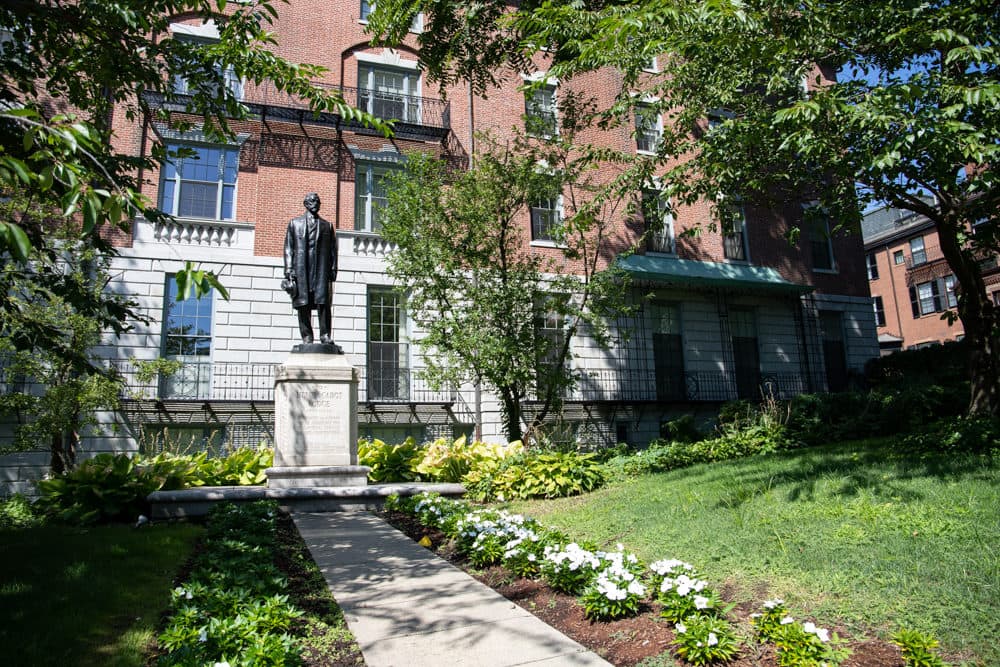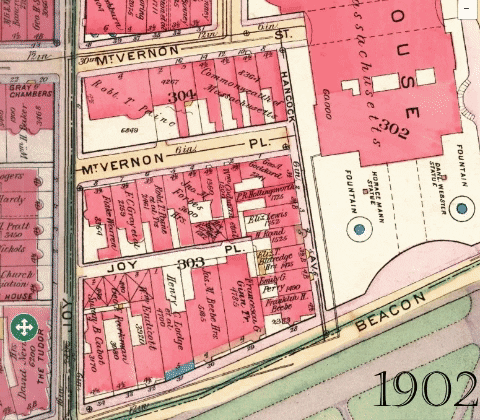Advertisement
Old Lease On State House Lawn Sliver Expiring

Lawmakers and the state's chief historical preservation officer are working through proposed solutions to a century-old planning mistake in the property boundary between the State House and a neighboring estate.
Much of today's state capitol grounds — the rolling lawns, bronze statuary and flower plantings — have replaced side streets and dozens of buildings that once stood in their place.
As state government grew, so did the State House. The West Wing extension in 1915-1916 resulted in the demolition of around 20 houses and pushed the State House lot line up against 25 Beacon St., the longtime headquarters of the Unitarian Universalist Association sandwiched between the west lawn and the city-owned Parkman House.
"The basic problem is, when the State House West Wing was built, and property was taken, the property line between the State House and the building was miscalculated," Rep. Jay Livingstone told State House News Service. "And so the building is a foot or so on the wrong side of the State House line."
Livingstone said that the problem was temporarily solved 98 years ago by granting a 99-year lease of that sliver of lawn back to the building's owner for $1, but the lease is soon to expire. In an attempt to fix the issue, he filed a bill this session to authorize the renewal of that lease.

The Unitarian Universalist church sold its Beacon Hill properties, including 25 Beacon St. and a building in the rear on Mount Vernon Place that also borders the State House, in 2014.
The subject of lot lines bubbled up during subsequent renovations to 25 Beacon St., when Gov. Charlie Baker in 2016 proposed granting the owners a permanent easement on the capitol lawn intended to facilitate construction of au pair suites. That idea fizzled after sharp opposition from Secretary of State William Galvin, who chairs the state Historical Commission, and the renovation project has since been completed.
The mansion was divided into six full-floor residences boasting a wine cellar, on-site garage with a valet, and a 24-hour doorman, and the penthouse floor was listed in 2016 for $11.5 million.
Livingstone said his bill is separate from Baker's 2016 proposal, which dealt with "window wells that were much larger that would have expanded out into State House grounds" and a parking space on the wrong side of a fence. "The legislation that caused controversy, that Gov. Baker filed, was much more expansive," he said.
"So, none of that's an issue," Livingstone said. "This is just, there's an existing structure on a lease that was written almost 100 years ago to make up for a surveying error that was made during the expansion of the West Wing. And it is coming to the end of that lease, and so we've got to do something."
As originally drafted, Livingstone's bill would allow the governor to grant permanent easements or lesser interests to abutters for purposes like use and maintenance of walls, cornices, balconies, and "minor existing encroachments onto State House property."
After opposition from Galvin, the legislation was substantially rewritten earlier this month by the Committee on State Administration and Regulatory Oversight, chaired by Rep. Danielle Gregoire and Sen. Marc Pacheco, to remove the authorization of easements or leases to abutters. Instead, neighbors would be able to buy "temporary construction licenses" if they need access to State House property to work on their building. The proceeds from those licenses would go into a new State House Capital Fund.
"Secretary Galvin was opposed to the lease language and the terminology with unconditional access," Gregoire said. "So my staff worked with the secretary's office to get this new language that's conditional access for a fee, that will go into a trust that can be dispensed at the governor's authority. And so the secretary agreed with the new language, and they helped us draft it, which is why we put it out the way we did."
She added that her co-chair Pacheco afterwards sought to cancel the committee's poll to approve the bill because he wanted to be sure that Galvin would support the new language, but the poll had already been sent to committee members because of a "miscommunication."
"He's not happy with me about it," Gregoire said of Pacheco. "He was kind of pissed. He wanted me to pull back the poll. And I wasn't going to do it. Because our rules were pretty clear, that the bill had been polled, the poll had closed, and that was it."
Pacheco's office confirmed that he wanted the poll held up to wait for a written opinion from Galvin's office definitively stating whether the new changes were acceptable.
Galvin's office told the News Service they are still reviewing the new draft, which was recommended by the State Administration Committee on Aug. 6 and now sits in House Ways and Means.